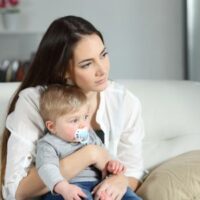Divorcing With an Infant

The best time to divorce is when you don’t have children. Kids definitely make a split more complicated. Many people assume that things are different when you have an infant. A baby isn’t going to care if you divorce their father, right?
You may think babies don’t have to experience the stress of their parents divorcing, but that’s not necessarily true. While your baby isn’t going to throw a temper tantrum over not seeing Daddy, they can still experience stress over the divorce. And things can actually be a little more complicated because you don’t know what your baby is feeling, as they can’t express themselves.
Divorce affects newborns and babies in ways that parents don’t realize. Even a fetus inside their mother’s womb can be affected by their parents’ emotional turmoil. While babies can’t understand their family situation, they still experience emotional upsets and environmental changes in nonverbal ways. When there are changes in caregiving, babies notice parental stress levels and may experience attachment disruptions. Here are some reasons why babies may be affected by divorce.
The First Year of Life is Critical for Brain Development
Before they turn 1 year old, babies learn from how their needs are met: If their needs are met reliably, they will learn to trust those who care for them. The primary attachments formed in their first year are critical. Divorce disrupts these attachments. Babies don’t have a sense of time and lose their sense of security when they don’t have frequent contact with each parent. Babies may end up stressed or confused.
Babies Are Like Emotional Sponges
Babies are able to pick up the emotions of their caregivers. They are sensitive to their parents’ facial expressions and nonverbal energy. When parents are angry or under stress, a baby will sense this negative energy. The baby may then experience fussiness or feeding and sleeping issues.
Chronic Stress
Parents in a high-conflict divorce are exposing their babies to chronic stress. This can actually have long-term consequences on brain development. A baby’s body may continually release cortisol, which affects the babies’ immune systems and nervous systems. As children get older, they may experience difficulties with emotions.
Also, babies need parents who can be fully present with them. Babies thrive when parents are joyful in their interactions. A parent who is distracted, depressed, or angry can negatively affect their baby’s development in terms of emotions and secure attachments.
Parents need to support their baby by maintaining a predictable routine. Also, parents should aim to keep conflict away from the baby and keep interactions positive.
Seek Legal Help
Divorce can be challenging with an infant. While the child may not have bonded with both parents, they can still experience stress.
No matter the age of your child, Fort Lauderdale divorce lawyer Edward J. Jennings, P.A. can help you divorce with ease. We understand the laws and guidelines that apply. Fill out the online form or call 954-764-4330 to schedule a consultation today.
Source:
psychologytoday.com/us/blog/a-better-divorce/202505/divorcing-when-pregnant-or-with-an-infant

